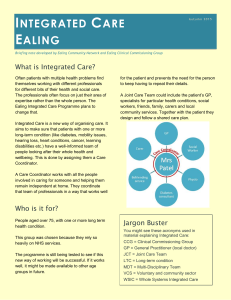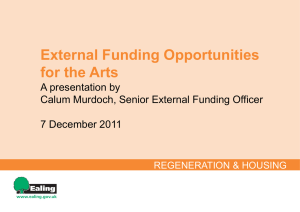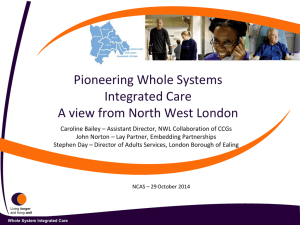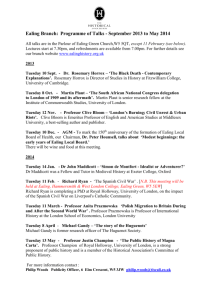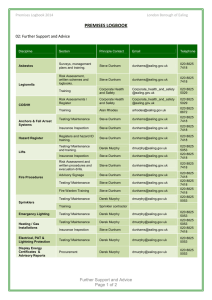'From Grant Funding to Individual Budgets: The Impact On Day Services' (ppt, 142 KB)
advertisement
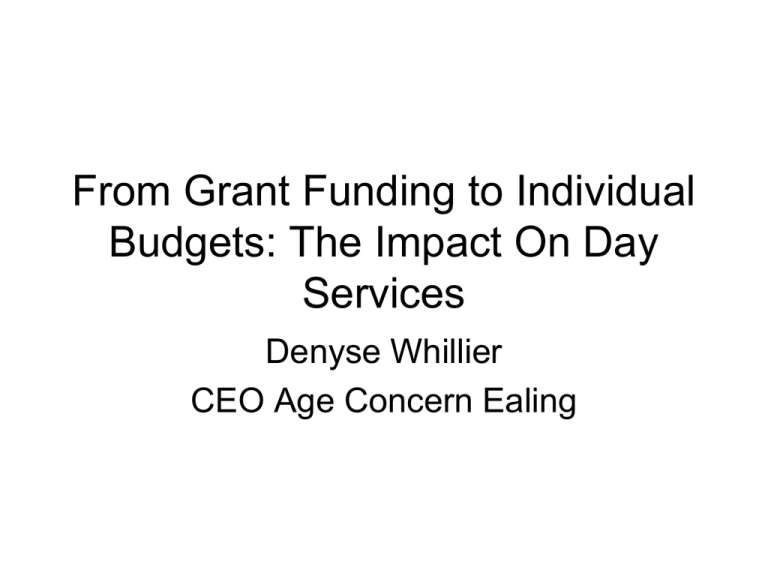
From Grant Funding to Individual Budgets: The Impact On Day Services Denyse Whillier CEO Age Concern Ealing The Context • Day services are funded through a grant from Ealing Council/ PCT towards the costs of running services; • The balance is made up from income generated from charging for services and fundraising; • 84% of the charity’s income comes from grants; • The service is being re-commissioned from October 2011 with the grant substantially cut; • Because of recent funding cuts, the cost base will be spread across fewer “business units.” Underpinning Principles & Drivers For Change At National Level • • • • • • • Prevention Personalisation Partnership Plurality Protection Productivity People About Our Day Services • One service is run from 2 sheltered housing units - capacity is restricted by room size; • A second service is run in partnership with Ealing Council through a community resource centre that is intended to provide a diverse range of services; costs are currently contained through an SLA on rent, utilities etc; • Both services operate to registration standards following earlier reviews and the expectation that they were to be regulated; • Both services operate high quality case management systems. Current Challenges • Actual attendances are some 30-40% less than the number of allocated places; • Income from charging can fluctuate significantly which makes forecasting difficult; • Marketing; • Staff understanding that these services have to operate in a business like manner if they are to be financially sustainable; • Ealing Council wants the voluntary sector to develop services for those with ‘substantial’ and ‘critical’ needs. The FACS Eligibility Criteria • Day services meet the needs of people from ‘low’ to ‘critical’ needs; • Those we estimate have ‘substantial’ and ‘critical’ needs will require assessments by Ealing Council; • There is an overlap with Ealing Council provision at one centre which could mean we become competitors. An Added Dimension • Staff undertake comprehensive assessment of needs and put together case plans, similar to support plans – will this be necessary going forward? • If not, what will happen to the expertise and reputation we’ve built up? • ACE takes 3-6 social work students on placement each year. Personal Health Budgets • A pilot involving around half the primary care trusts in England is currently underway, testing out personal health budgets in the NHS. • What impact will this have going forward? Issues To Consider • • • • • The financial risk is shunted to the provider because each service is purchased individually, rather than on behalf of a group. Services will have to manage take up through overbooking and clear protocols around payment for example. Costs have to be accurate and take into account non attendances. Barriers to non attendance e.g. expensive and inflexible transport have to be addressed. Local authorities set the benchmark for what they are prepared to pay for services. However the price (and quality) of a service has to be at a level that the person thinks is acceptable too or s/he will make alternative arrangements. More Issues….. • The volume of administrative work will increase and require resourcing. • The infrastructure and systems have to be fit for purpose. • Given the level of financial risk, the charity cannot be financially dependent on income from day services. • The local authority has to work with the voluntary sector to manage this change. • The charity has to become the provider of choice. • Marketing will increasingly become a key activity. And Finally • Is this a move back to lunch clubs? Any Questions?
